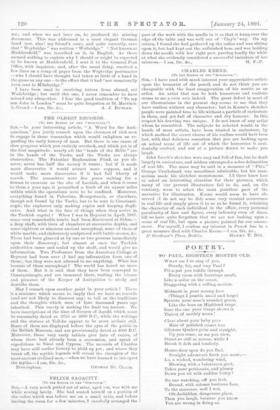THE OLDEST RECORDS.
r.To Till EDITOR OP THE " BFECTATOri,"1 your interesting article, "A Word for the Anti- quarians," you justly remark upon the slowness of rich men to engage in those researches which would enlighten Us re- garding the early history of man. But there is one cause of slow progress which you entirely overlook, and which yet is of the first magnitude ; nearly all the "lands of the Bible" arc in the hands of the Turks, and the Turks are always obstructive. The Palestine Exploration Fond, as you ob- serve, never has half the money it wants ; but if it made more discoveries it would attract more support, and it would make more discoveries if it had full liberty of search. The committee were five years waiting for a firman to excavate on the site of Laehiele, and when it came to them a year ago, it prescribed a limit of six square miles within which the operations were to be confined. Moreover, everything found in Palestine, Mesopotamia, or elsewhere, though not found by the Turks, has to be sent to Constanti- nople, the explorers only making copies and keeping dupli- cates. And what is the fate of things when they arrive in the Turkish capital ? When I was in Beyrout in April, 1887, some very remarkable tombs had been discovered at Sidon,— a deep shaft, with tiers of chambers at successive depths, and some eighteen or nineteen ancient sarcophagi, some of them of white marble, and elaborately sculptured with battle-scenes, etc. These had been glanced at by one or two persons immediately upon their discovery; but almost at once the Turkish authorities came and sealed up the shaft, and would give no information. Two Professors from the American College at Beyrout had been over (I had my information from one of them), but they were not allowed to see anything. What has become of those sarcophagi ? The world has heard no More of them. But it is said that they have been conveyed to Constantinople, and are immured there, waiting the leisure and pleasure of the Keeper of Antiquitiee to study and describe them.
May I remark upon another point in your article ? There is a sentence which seems to imply that we have no records (and are not likely to discover any) to tell us the traditions and the thoughts which men of four thousand years ago inherited. This surely is making the limit too narrow. We have inscriptions of the time of Sargon of Agad6, which must be reasonably dated at 8750 or 3800 B.C., while the writings and the statues at Tell-ho appear to be more archaic still. Some of them are displayed before the eyes of the public in the British Museum, and are provisionally dated at 4000 B.C. Moreover, these very early tablets give lists of rulers, of whom there had already been a succession, and speak of expeditions to Sinai and Cyprus. The mounds of Chaldea may have kill earlier history to yield up yet ; and where they break off, the mythic legends will reveal the thoughts of the most ancient civilised men,—when we have learned to interpret the myths.--1 am, Sir, &e.,






































 Previous page
Previous page